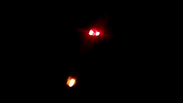
Alleged Israeli strike on Syria-Lebanon border. Dangerous new parameters
Attack on Syria-Lebanon border: A risk worth taking
Analysis: Latest alleged Israeli strike added Hezbollah and Iran into the game, but thwarting the transfer of weapons is a sensible investment which will pay off in the future.
The attack on a weapons convoy on the Lebanon-Syria border, which according to foreign reports was carried out by Israel, is the seventh such strike in the recent months and part of the ongoing battle against the smuggling of arms to terror organizations, led by Hezbollah.
The Iran-Syria-Hezbollah axis of evil is conducting an extensive system of smuggling weapons to terror groups in our region, so that they will direct them at Israel. The State of Israel has been fighting this arms smuggling for years in different arenas. It's enough to mention the takeover of the Karine A, Victoria and Francop vessels, the strikes in Sudan and the assassinations Israel has not assumed responsibility for, like the killing of senior Hamas member Mabhouh in Dubai – which were all aimed at damaging the smuggling system, which is mostly run by the Iranian al-Quds Force.
The Hezbollah smuggling system passes through Syria. Israel failed to prevent the transfer of weapons after the Second Lebanon War, and the organization equipped itself with more than 100,000 rockets, most of them inaccurate. After that move was crowned with success, Hezbollah began working to obtain advanced anti-aircraft missiles in order to hit Air Force planes, anti-ship missiles in order to hit Navy vessels, and long-range accurate surface-to-surface missiles in order to hit high-quality targets deep within Israel.
Israel's policy has always been clear: Not to allow the transfer of high-quality weapons to Hezbollah, in order to maintain the IDF's freedom of action in the air and in the sea and prevent the future firing of long-range and accurate missiles on strategic targets in Israel. The Syrians were warned, and for several years the deterrence worked and Assad avoided transferring advanced arms to his Lebanese colleague. But the military aid Assad is receiving from Hezbollah as part of the civil war in Syria has created a Syrian commitment towards Hezbollah, and the Syrians have begun transferring advanced weapons to the organization.
Israel decided to thwart these smugglings. Taking good advantage of the situation in Syria allowed the creation of a "denial area" (Assad will deny that Israel struck and will not respond), and Israel – according to the foreign reports – attacked advanced weapons caches on Syrian soil which were designated for Hezbollah.
The latest strike was different. It was carried out in the border crossings area between Syria and Lebanon, when the arms had already reached Hezbollah. Nasrallah is also submerged up to his neck in the war in Syria and is not interesting in opening a second front, but the direct conflict between Israel and Hezbollah adds dangerous new parameters to the equation.
First of all, the operation was carried out on Lebanese soil and it adds Lebanon – with all its complexity – into the game. Hezbollah is a terror organization whose considerations are unlike the considerations of a state, and Nasrallah is not Assad. Hezbollah has diverse options of action, like firing from Syrian soil, domestic terrorism or activities abroad (like in the Argentina and Burgas cases). And he is also a protégé of Iran, which joins the equation.
Israel must continue thwarting the smuggling of high-quality weapons to Hezbollah. This is a sensible investment in the present which will make the future much easier, and a risk that has to be taken. The changes in the arena are challenging and require decision makers to reconsider the selected method of action every time. It has to be as vague as possible, with the widest possible "denial area."
The latest strike, the seventh one, has made the day-after equation even more complex, and has put Hezbollah and Iran in the game. It's reasonable to assume that in the near future we'll see more attacks on high-quality weapon convoys trying to make their way to Hezbollah. It's important to do this in a way which will minimize the damages of the day after as much as possible.
Vice Admiral Eliezer Marom was the commander of the Israeli Navy in the years 2007-2011










